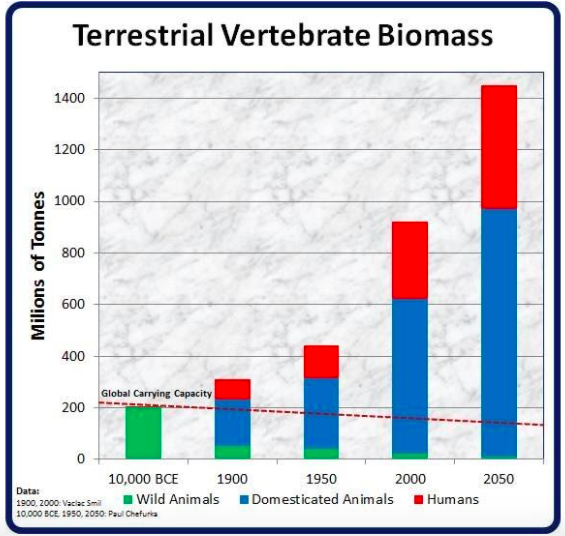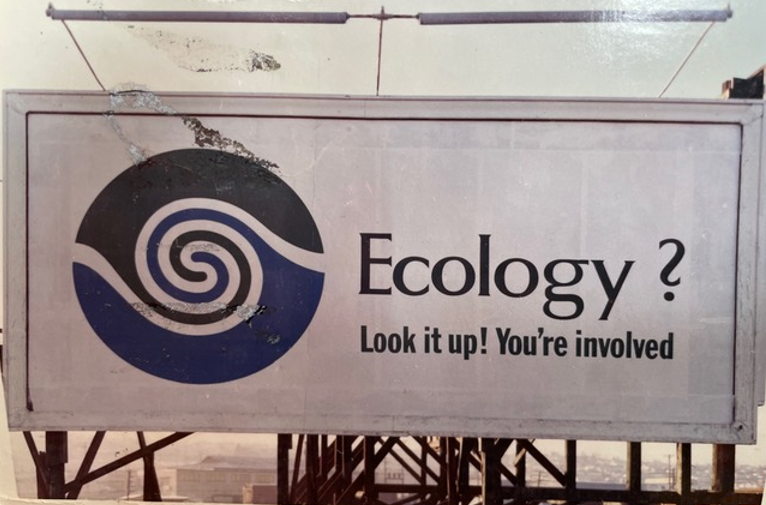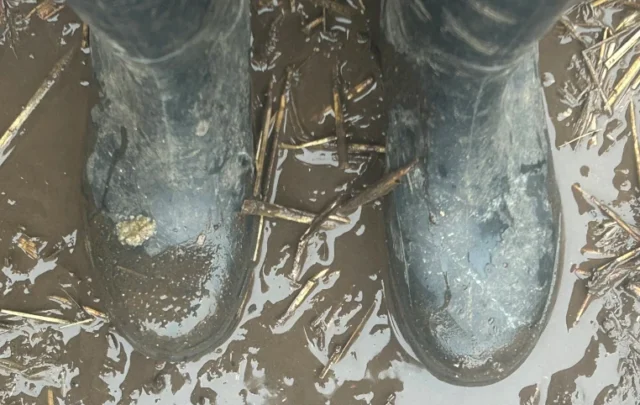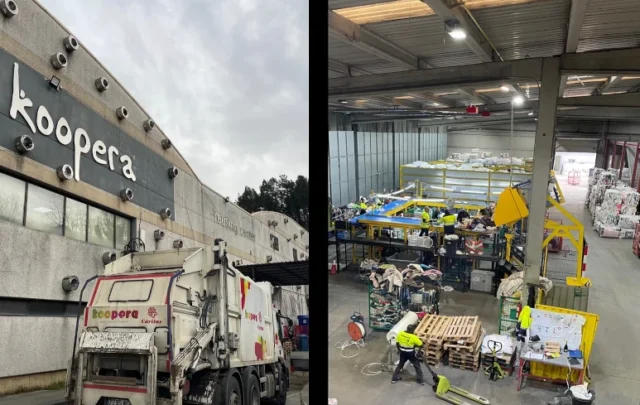This year has been the 50th Anniversary of Greenpeace; 2022 will be the 50th anniversary of the Limits to Growth study. During this era, a half-century ago, citizens around the world began seeing signs of a pending ecological crisis, and began to talk about it.
This image, below, could be considered the first Greenpeace public media statement, one of twelve billboards erected in Vancouver, in 1969, by Greenpeace co-founders Dorothy and Ben Metcalfe.
At the time, “ecology” was not commonly understood, most universities did not have ecology departments, there was no activist environmental movement, and conservation groups such as the Sierra Club focused primarily on preserving parks.
However, Rachel Carson’s Silent Spring had exposed pesticide impacts and awakened an ecological awareness. In New York, four scientists formed the Environmental Defense Fund to bring ecological abuses before the courts. The tide was turning.
In Vancouver, Canada, Ben Metcalfe hosted a naturalist show, Klahanie, on CBC television, and used that platform to help halt the flooding of nearby Skagit River Valley by a Seattle power company. With other ecology activists in Vancouver, a group that would later be called “Greenpeace,” — Dorothy and Irving Stowe, Bob and Zoe Hunter, Jim and Marie Bolen, Bill Darnell, the Metcalfes, and scores of others — they helped halt a highway through the middle of Vancouver preserving the city’s magnificent shoreline. The ecologists felt invigorated by the taste of victory.
In the summer of 1969, while fishing in Howe Sound, near Vancouver, Ben Metcalfe witnessed the stench and bellowing smokestacks of the local pulp mill. When he raised the pollution issue at a BC Forestry Commission meeting, a Canadian Forest Products vice-president told him that to grow our economy, “We have to accept it.”
“No, we don’t,” Metcalfe replied, drawing gasps from some of the other journalists.
Metcalfe created a logo to represent the environment, two waves joined together into a spiral maze. “If you can promote companies and products,” he told his friends, “you can promote ideas.” They commissioned the billboards, reading:
Ecology?
Look it up! You’re involved.
How are we doing?
Over half a century later, this invitation to “look up” ecology may still be relevant.
Today, of course, there exists a robust environmental movement, thousands of environmental groups, environment agencies and departments, environmental legislation, myriad “green” products, and a relentless charade of international climate conferences.
Unfortunately, by no significant measure can we say that human society is more sustainable today than it was in 1970. Environmental awareness has soared, but effective ecological action, or relevant social change, has faltered repeatedly.
Today, we have less wilderness, more plastic in the oceans, and more toxins in our soils. Since 1970, the Living Planet Index has declined by over 60%. Fish, amphibians, reptiles, birds, and mammals have declined by 58%. Domesticated poultry, primarily chickens, account for two-and-a-half-times the biomass of all wild birds. By 2018, according to the Census of Earth’s Biomass, reptiles and amphibians have been so reduced they are now considered “negligible.”
Since 1970, as biodiversity has collapsed, the human population has more than doubled. People now account for 36% of all mammal biomass on Earth; our livestock and pets account for 60%. All wild mammals, marine and terrestrial — all the whales, elephants, raccoons, rodents, squirrels, tigers, and dolphins — account for only 4% of mammal biomass on Earth.

Chart data from Paul Chefurka and Vaclav Smil
Insect populations have declined from pesticide use and from the destruction of habitat, linked to wetland loss. Butterflies, cicada, and many beetle species have disappeared from some habitats. The loss of pollinators has harmed wilderness biomes and human crops. Biologists have found over 150 industrial chemical residues in bee pollen, which University of California apiculturist Eric Mussen calls “a deadly pesticide cocktail.” The primary toxins harming bees — clothianidin, imidacloprid and thiamethoxam — remain common commercial products of Bayer/Monsanto, Syngenta, DuPont and other chemical companies.
According to a 2013 study by Anna M. Magera, et al., at Dalhousie University in Canada, on average, marine mammal species have declined by 71%, and although some have slightly recovered, shoreline species of whales and otters remain depleted by over 90%.
Our fishing fleets have depleted 85% of commercial fish stocks and 90% of “big fish” — tuna, marlin, and sharks. Oxygen-depleted ocean zones have increased by 75% and ocean acidification is depleting the coral reefs.
Some in the human family are aware of these crises, some deny most or all of the ecological crisis, and meanwhile most people have to work so hard every day to survive that they have scarce time to defend their depleted habitats. Nevertheless, collectively, we, as human society, have failed to effectively mitigate, much less solve, the ecological crisis of our age. Just repeating the sad data may not help, but those who see the warnings might well remind ourselves how well our strategies are working.
About half of Earth’s great Pleistocene forests are gone, and much of the remaining forests survive as tree farms or skeletal forests with declining plant and animal life. Instead of sequestering carbon, many depleted forests are now net carbon emitters. According to a Science News report by Simon Lewis, forest ecologist at University College in London,
“Single-tree commercial crop plantations [vulnerable to soil destruction and logging] … can release more carbon than they sequester.”
According to a NASA study, global heating has led to more frequent fires, reducing forests world-wide. The massive fires in Siberia are now emitting CO2 and methane, the two most severe greenhouse gases.
Climate vs. overshoot
The recent climate meeting in Glasgow, COP-26, represents the 34th international climate meeting since the first conference in Geneva in 1979. During those 42 years of climate conferences, human carbon emissions have doubled from 5 gigatonnes annually (5 GtC/yr) to over 10 (10 GtC/yr).
Clearly, something is wrong with our global, political response to the ecological crisis. It appears that perhaps we still do not really understand the complexities of ecology at all.
One of the problems may be that we are failing to address the root problem. Most political voices, media pundits, and even environmental groups have, for the past decade, focused on climate change. We indeed have a climate crisis, but our carbon emissions are not at the root of our challenge.
Carbon emissions — like all toxic waste, plastics, and endocrine disruptors — are a symptom of our larger, more fundamental problem: Humanity has overshot the capacity of Earth to supply energy and materials necessary to operate modern industrial culture, and to process our waste.
“Climate change is not the real existential threat,” wrote ecologist William Rees in a recent essay, “OVERSHOOT is.”
Rees, emeritus professor of ecology at the University of British Columbia, and developer of ecological footprint analysis, explains that
“Overshoot occurs when people use energy and biological resources faster than ecosystems can regenerate, and pollute beyond nature’s assimilative capacity. It’s a meta-problem, the cause of most so-called ‘environmental problems’ including climate change.”
Since 1979, we have witnessed 34 failed climate conferences because, while completely failing to solve the one symptom they claim to recognize, those conferences have not once addressed the underlying meta-problem: overshoot of Earth’s capacities.
[slide-anything id=’3472166′]
Likewise, since the 1970s, more sanctuaries and protected areas have not slowed the biodiversity decline.
We have more toxic waste legislation every year, and more toxins in our ecosystems and bodies.
We have more environmental protection agencies and less wilderness.
We cannot solve climate change or other symptoms of overshoot — including global injustices and the lingering threat of more pandemics — without really understanding and feeling deeply the lessons of wilderness, of ecology. To address these deeper issues, our human institutions, from environmental groups to governments, will have to learn to better understand the way organic systems function.
Our devotion to “market-based solutions” continually fails because we get distracted by what journalist George Monbiot calls “micro-consumer bollocks;” instead of slowing our growth to arrest overshoot, we pretend to take action by changing our light bulbs, electrifying private cars, and buying “sustainable” ear-buds.
Our pretense to “manage” nature fails because the presumed managers do not yet know how natural systems actually work, and if they did they would not be talking about managing nature at all. Genuine solutions will derive from whole-systems awareness, from becoming students of nature, not managers. We cannot solve or even alleviate any symptom of ecological overshoot in isolation from the other symptoms, or without addressing the root problem.
“However,” Dr. Rees writes, “if we reverse overshoot, all its symptoms would be alleviated simultaneously.”
Spend time in wilderness, even human wilderness, and become a student, not a fixer or manager.
Ecology: Look it up. You’re still involved.
Links and references
Ecology sources:
“Census of Earth’s Biomass,” Yinon M. Bar-On and Ron Milo, Weizmann Institute of Science and Rob Phillips, California Institute of Technology, June 19, 2018, PNAS, Proceedings of the National Academy of Sciences (US).
EU top court upholds ban on Bayer pesticides linked to harming bees,” Kate Abnett, Reuters, May 6, 2021.
“Review of Neonicotinoid Use, Registration, and Insect Pollinator Impacts in Minnesota,” Dan Stoddard, Carmen Converse, et al., Minnesota Department for Agriculture, pdf, 2016.
“Recovery Trends in Marine Mammal Populations,” Anna M. Magera, et al., PLoS ONE 8(10), 2013
“Forests Scorched by Wildfire Unlikely to Recover, May Convert to Grasslands,” Lisa Marshall, University or Colorado, August 25, 2020.
“Wildfires are erasing Western forests. Climate change is making it permanent,” Nathanael Johnson, Grist, Nov. 2021.
“Burned-out Forests Are Not Re-Growing,” R. Hunziker, Counterpunch, Dec. 2021,
“Why Planting Tons of Trees Isn’t Enough to Solve Climate Change,” Science News, July 9, 2021)
“Meteorologists Shocked as Heat and Fire Scorches Siberia,” Adam Voiland, NASA Earth Observatory, SciTech Daily, June 2020:
A note on Climate Change and Cultural Denial, William Rees, Population Matters, November, 2021.
Teaser photo credit: One of twelve billboards erected in Vancouver, in 1969, by Greenpeace co-founders Dorothy and Ben Metcalfe. Author supplied























